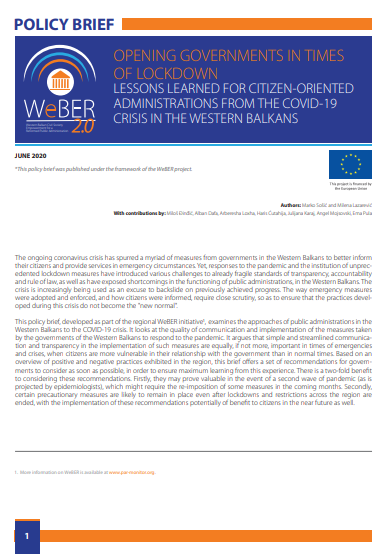Opening governments in times of lockdown

The ongoing coronavirus crisis has spurred a myriad of measures from governments in the Western Balkans to better inform their citizens and provide services in emergency circumstances. Yet, responses to the pandemic and the institution of unprecedented lockdown measures have introduced various challenges to already fragile standards of transparency, accountability and rule of law, as well as have exposed shortcomings in the functioning of public administrations, in the Western Balkans. The crisis is increasingly being used as an excuse to backslide on previously achieved progress. The way emergency measures were adopted and enforced, and how citizens were informed, require close scrutiny, so as to ensure that the practices developed during this crisis do not become the “new normal”.
This policy brief, developed as part of the regional WeBER initiative, examines the approaches of public administrations in the Western Balkans to the COVID-19 crisis. It looks at the quality of communication and implementation of the measures taken by the governments of the Western Balkans to respond to the pandemic. It argues that simple and streamlined communication and transparency in the implementation of such measures are equally, if not more, important in times of emergencies and crises, when citizens are more vulnerable in their relationship with the government than in normal times. Based on an overview of positive and negative practices exhibited in the region, this brief offers a set of recommendations for governments to consider as soon as possible, in order to ensure maximum learning from this experience. There is a two-fold benefit to considering these recommendations. Firstly, they may prove valuable in the event of a second wave of pandemic (as is projected by epidemiologists), which might require the re-imposition of some measures in the coming months. Secondly, certain precautionary measures are likely to remain in place even after lockdowns and restrictions across the region are ended, with the implementation of these recommendations potentially of benefit to citizens in the near future as well.
Download the brief here.
Opening-governments-in-times-of-lockdown_WeBER-policy-brief

